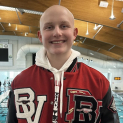Identifying how Pre-existing Anti-Therapeutic Antibodies (PATA) are Associated with Better Outcome in a Clinical Trial of ADCC-inducing Anti-GD2 mAb
Background:
We are developing and using immunotherapy to treat children with cancer. Immunotherapy is a newer class of cancer treatments that help the immune system eliminate cancer, while not having the same side effects as traditional chemotherapy approaches. We use lab-generated tumor-seeking molecules, called monoclonal antibodies (mAbs) that help a patient's immune system find and destroy cancer. Our team helped lead studies that showed how mAb-based therapy prolongs survival for children with high-risk neuroblastoma, a serious cancer of children. In order to further improve mAb therapy, our lab is testing the blood samples from children receiving mAbs for treatment of neuroblastoma to measure the immune reactions that occur. In a recent clinical trial of a mAb for neuroblastoma, we discovered that some patients had a pre-existing antibody in their blood that actually bound to the mAb that they received as their treatment. This pre-existing antibody was present in blood samples that were obtained before any mAb treatment. Importantly, the presence of this pre-existing antibody seemed to predict which patients would do best (live longer without the cancer growing) with this mAb treatment.
Project Goal:
This ALSF research project will accomplish two milestones; first we will learn what this pre-existing antibody is recognizing on the mAb that we use for treatment. Second, we will determine how this pre-existing antibody may be helping the mAb treatment work better. Our overall goal is to use what is learned from this study to make mAb-based immunotherapy more effective in eliminating childhood cancers.

